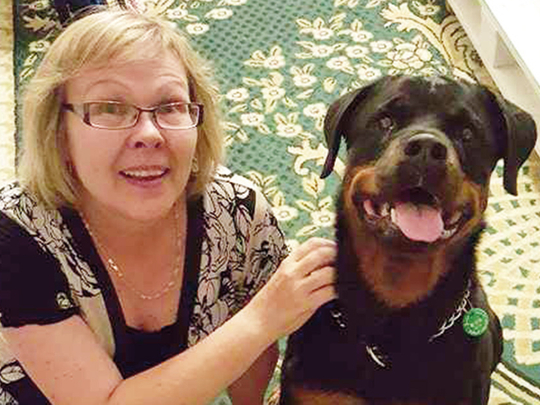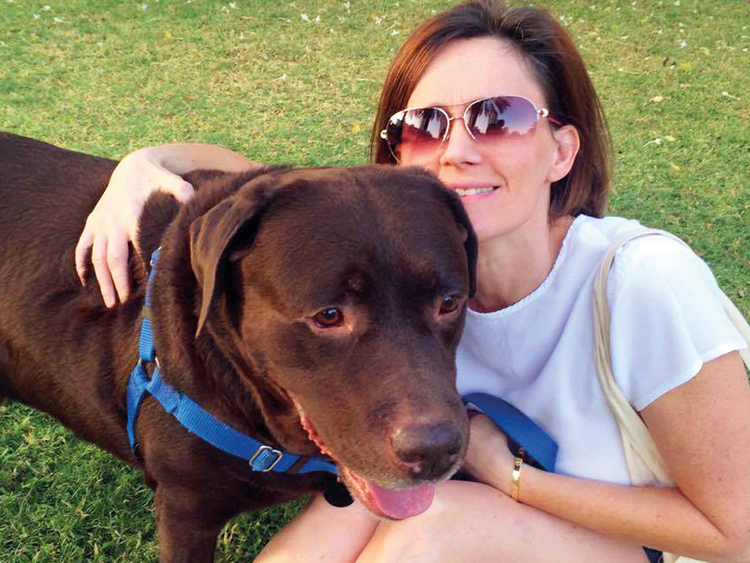
Dubai: Pet owners in the UAE, including those who own any of the seven breeds of dogs that have been banned, are required to obtain a licence and vaccination certificate before July 1.
Dog breeds, including pitbull, Doberman, Rottweiler, tosa, boxer, presa canario, and mastiffs are listed among exotic and dangerous pets, and will be banned in the country, according to a new law that comes into effect from July 1.
“This will limit the sales of dogs and also limit the purchase from pet shops. New regulations will not let you move them forward, sell them or buy them, if you already have them you need to register them before the given date or else you can face legal action,” Dr Sara Elliott, founder and veterinary director of British Veterinary Hospital told Gulf News.
The new federal law on Regulation of Ownership of Dangerous Animals, announced in January, also states that all kinds of imported animals have to be registered and must carry certificates issued by authorities. Hefty fines will be issued to those who have not completed their paperwork within 30 working days from July 1.
Dogs must also be kept on a leash at all times when in public, as those who fail to do so will face a fine of at least Dh10,000, but not more than Dh100,000.
However, the question many people are asking is how dangerous are these seven banned breeds of dogs.
Dr Elliot explained that any breed can be dangerous without proper training. “A dog who is not exposed to many different situations as a young puppy can become fearful and aggressive,” she said.
As the first eight to 12 weeks of a dog’s life is critical, dogs raised in complete isolation can act aggressively towards unknown things. “The more your dog has been exposed to, the better its temperament will be,” said Dr Elliot.
She also pointed out that smaller dogs such as chihuahuas or terriers are generally more likely to be aggressive, but their size makes them more manageable and less likely to cause lasting damage.
“The dogs mentioned above are from breeds that have traditionally been used for guarding and fighting. They are exceptionally large and strong, if they are not trained by professionals, there is a possibility for them to cause damage,” said Dr Elliot.
She explained the breed group of mastiffs is likely to come from the similar Latin term meaning huge or massive. “They come from a long line of working dogs and the characteristics required for a guard task does not always make them a friendly pet suited to living in an urban environment,” she said.
However, Dr Elliot believes that any breed of dog can show aggression and act unpredictably if raised incorrectly by irresponsible owners. “Unfortunately, the following dogs seem to have had a lot of media coverage regarding their temperament and disposition,” she said.
Dog owners, especially those who own dogs that are large enough to cause substantial harm to others, need to be held accountable. “Instead of criticising the dog breeds, more needs to be done to enforce proper training, treatment and control by their owners,” suggested Dr Elliot.
She pointed out that most dogs will only attack if they, their family or their property is threatened in any way. She also advised dog owners to ensure their pets are socialised from a very early age and trained using positive techniques such as rewarding good behavior.
“In dogs just as in humans, just because they have the ability to be aggressive, does not mean that they will be,” she added.
Looking at pet laws in other countries, the group of banned breeds in the UAE are consistent with banned dogs in other countries. “The majority of airlines ban these dogs from travelling, or have strict rules and exceptions when transporting them inclusive of extra restrictions on cages,” said Dr Elliot.
Other exotic animals
The new law also states that owners of exotic and dangerous pets have to hand in their animals to the authorities before July. Banned animals include snakes, scorpions, lizards, and spiders.
A fine of Dh50,000 to Dh500,000 along with jail time will be issued to residents for possession of dangerous animals for trading purposes, and a fine of Dh700,000 to Dh1000,000 fine and/or jail time for using animals to terrorise people.
Any attack by a pet or dangerous animal that leaves a person permanently disabled will result in its owner being jailed between three and seven years. Just the same, if the attack leads to death, the owner will face life imprisonment.
How to get you cat/dog registered:
1. Get all your pet documents in order which include up-to-date vaccination reports and other medical documents.
2. Take your pet into your regular vet clinic (call ahead to ask them about the registration) or to the Dubai Municipality veterinary centre.
3. Pets require general vaccinations annually and vaccinations against rabies. If your pet is due for the annual vaccinations, get them done before the registration process.
4. Be prepared to submit your complete contact information and Emirates ID for the process.
5. For all pets registered in Dubai, a micro-chip is required to be implanted between the shoulders which is traceable to the database. If you just got a pet in the UAE, this is a necessary procedure. If your pet already has had it done, carry necessary documents to prove it or ask for a scan to show that the chip has been implanted.
6. Once the micro-chip is implanted, pets are given a registration tag or ID which the owner must attach to the pet’s collar in a visible manner at all times. Any animal found without a tag will be considered a stray.
This registration procedure can cost upto Dh95 at a private veterinary clinic but may be lesser if done at the Dubai Municipality veterinary centre.
Nabeel Mohammad, India
“I own a pet shop, and I would say the law is good to an extent. Everyone loves to have a pet, but many people don’t get them trained. Around 40 to 60 per cent of people who own pets on the banned list, have very good knowledge on the breed and what it needs. They spends a lot of time training the pet and socialising them with other dogs. So it’s sad to see such dog owners suffer because other owners are not taking care or training their pets well. Recently we saw a video of a cat being killed by the rottweilers. However, that isn’t based on dog’s breed because regardless of the breed, any dog trained to kill will do the same.”
Shirley Baker, Scotland
“I feel by banning certain breeds, more dogs than usual will be abandoned. I do not understand how people can determine a certain breed of dog dangerous. I don’t believe any dog is dangerous, people make them that way. I certainly come across unsocialised dogs here, that’s not danger or aggression, it’s because people haven’t put any effort into training them. I would much prefer that something was done here about animal cruelty instead of constantly penalising people that have dogs. Responsible dog owners have vaccination records, municipality tags and pick up after their dogs. Not every dog owner is responsible, but then neither is every parent. Dubai, amazing as it is, is not a place for dogs. They’re not permitted off leash, not permitted in parks and generally have no freedom, which I believe adds to the socialisation problem. When people have children, they commit to teaching that child life skills, the same is required for a dog. What you put in is what you get out. I could never ever be without my dog, he completes my family.”
Anita Viherpuro, from Finland
“I have a playful rottweiler, and as an owner of what they’re calling a ‘dangerous breed,’ the new law put’s me under huge pressure and stress. It means that I can’t afford one single mistake because my dog could be taken into custody and shipped somewhere abroad. Dogs in general need to have fun and be active to use the energy they have, so they don’t get frustrated. Once they run and play they are extremely happy. I consider the new law as an ultimatum towards us pet owners. I wish the authorities would reconsider these laws and rules as they don’t improve anything, on the contrary, they make things worse for pets. There are dogs left out and abandoned, either because their owners are abusive or because they don’t want them anymore. I urge the authorities to focus on neglected animals neglect instead, and let us keep and take care of our dogs.”










